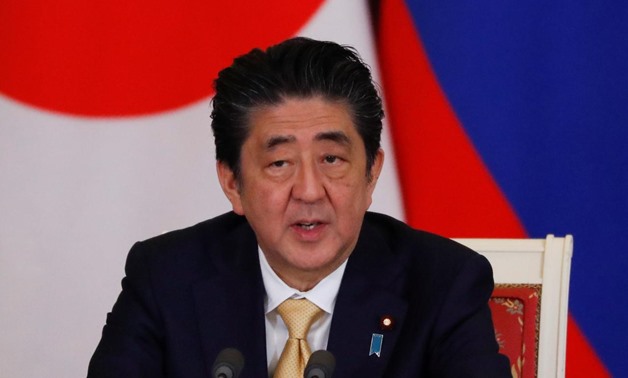
FILE- FILE PHOTO: Japanese Prime Minister Shinzo Abe attends a joint news conference with Russian President Vladimir Putin following their meeting at the Kremlin in Moscow, Russia May 26, 2018. REUTERS/Grigory Dukor
TOKYO, June 21 (Reuters) - Japan has decided to halt evacuation drills to prepare for a potential North Korean missile attack as tensions had eased following a historic summit between the leaders of the United States and North Korea, Kyodo news agency reported on Thursday.
U.S. President Donald Trump met North Korean leader Kim Jong Un in Singapore last week and Kim committed to “work toward complete denuclearisation of the Korean peninsula”, while Trump said he would end what he called “provocative” U.S.-South Korean military exercises.
Japan welcomed the summit as a first step towards the denuclearisation of North Korea, but also said the U.S.-South Korean exercises were a vital deterrent to North Korean threats.
North Korea last year launched two missiles that flew over Japan. It also conducted its sixth nuclear test.
Chief Cabinet Secretary Yoshihide Suga repeated that it was vital for North Korea to take concrete steps toward complete, verifiable and irreversible dismantlement of all its weapons of mass destruction and missiles.
Suga noted, however, that North Korea has said it would not conduct tests and Kim had promised complete denuclearisation.
"The situation is different from last year when missile launches were frequent and it is not a situation where missiles will soon come flying," he told a news conference, adding that the matter of the drills was under consideration.
Japan is eyeing a meeting between Prime Minister Shinzo Abe and North Korean leader Kim Jong Un, government sources said a week ago, and Japanese media have reported that one possibility was for Abe to visit Pyongyang, perhaps as early as August.
Promoted to commander of the U.S. Indo-Pacific Command (INDOPACOM) last month, Admiral Philip Davidson gave an assurance that the United States was committed its alliance with Japan and to securing North Korea's denuclearisation during his first official visit to Japan for two days of talks with Defence Minister Itsunori Onodera.
Japan, which hosts some 50,000 U.S. military personnel, including the biggest overseas concentration of U.S. Marines and a U.S. Navy carrier strike group, relies on the Washington for its defence and operates closely with its military.
Japan's capital of Tokyo held its first evacuation drill in January and smaller Japanese towns and villages have conducted similar exercises as North Korea pushed ahead with its missile and nuclear weapons programmes.
Kyodo said there were plans for evacuation drills this year in nine prefectures.
An official in Yaita, in northern Japan, told Reuters that Tochigi Prefecture, where it is located, had notified the city that the central government had decided to halt the planned drill "taking into account the international situation".
Kyodo said several other prefectures had also been notified of the imminent decision to halt the drills.

Comments
Leave a Comment